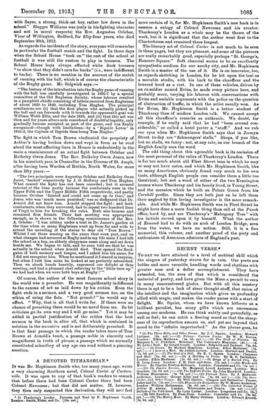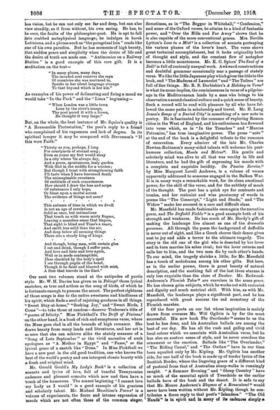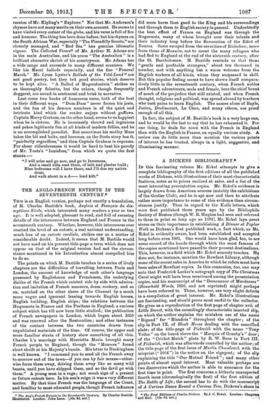RECENT TERSE.* TO-DAY we have attained to a level of
metrical skill which the singers of yesterday strove for in vain. Our poets are bolder and more versatile, handling words and rhythms with greater ease and a defter accomplishment. They have extended, too, the area of that which is considered the material of poetry, and have given the Muse a permit to rove in many unaccustomed glades. But with all this mastery there is apt to be a lack of sheer thought-stuff, that union of the intellect and the imagination which gives us profundity allied with magic, and makes the reader pause with a start of delight. Mr. Squire, whom we have known hitherto as a brilliant parodist, has many gifts which are uncommon among our moderns. He can think subtly and powerfully, as well as feel; be can catch a fleeting mood so that the sharp- ness of its reproduction amazes us, and yet see beyond that mood to the "infinite imperturbed." As the phrase goes, he
- -
• (1) The Three Hills. and Other Poems. By J. C. Squire. London : Howard Latimer. (2s. net.)-(2) Foliage : Various Poems. By W. H. Davies. London : Elkin Mathews. [1s. 6d. net.]-(3) The Drift of Pinions. By Marjorie L. C. Pickthall. Montreal: The University Magazine. [111.j-(4) My Lady's Book. By Gerald Gould. London : Sidgwick and Jackson. [2s. 6d. net.]-(S) Poems. By Michael Heseltine. London : Elkin Mathews. Ils. net.]-( ) Love in a Mist. By Judith Lytton. London: Herbert and Daniel. [7s. 6d. net.]-(7) The Soul of a Doll. By K. C. Spiers. London : Chapman and Hall. 12s. 6d. net.]---(8) A Holiday in Verse. By B. S. Darbishire. London : Elkin Mathews. [1s. 6d. net.] -(9) Songs of a Buried City. By H. Lang Jones. London : J-. M. Dent and Sons. [1s. net.)-(10) Moods and Metres. By Charles Newton-Robinson. London : Constable and Co. [5s. net.] -(11) On Passive Service. By Margaret Lovell Andrew.. London : Max Goschen. [2s. 6d. net.]-(12) 7 he Daffodil Fields. By John Masefleld. London : William Heinemann. [3s. 9c1. net.] -(13) Flemish Tales. By J. Redwood- Anderson. London : George Allen and Co. [3s. 6d. netl- (14) The Over. loader, and Other Verve. By Will Ogilvie. Glasgow and Dalbeattio: Fraser, Asher and Co. [3s. net.]-(15) Rhymes of a Rouaeabout. By W. Monro Anderson. London : William Heinemann. 13e. 6(1. net.] -(16) The Collected Verses of Arthur H. Adams. London : Whitcomb° and Tombs. [Ss. net.] -(171 Ballads of the Veld-Land. By Lynn Lyster. London: Longman. and Co. Rs. (18) Odd Numbers. By Dum-Dum. London : Constable and Co. [Se. 6d, net.] -(19) The Motley Muse. By Harry Gts.bam. London: Edward Arnold. 13s, 6d. net . ..
. . .
has vision, but he can not only see far and deep, but can also view steadily, as if from without, his own seeing. He has, to be sure, the faults of the philosopher-poet. He is apt to fall into crabbed metaphysical language; he indulges in harsh Latinisms, and a phrase such as "the peregrinal loin " reads like one of his own parodies. But he has moments of high beauty, ,that sudden peace and simplicity when the desire of life and the desire of truth are made one. "Antinomies on a Railway station " is a good example of this rare gift. It is a meditation on the text-
" In many places, many days,
The invaded soul receives the rays Of countries she was nurtured in, Speaks in her silent language strange To that beyond which is her kin."
As examples of his power of delineating and fixing a mood we would take "In the Park" and the " Lines " beginning-
" When London was a little town Lean by the river's marge, The poet paced it with a frown, He thought it very large."
But, on the whole, the best instance of Mr. Squire's quality is " A Reasonable Protestation," the poet's reply to a friend who complained of his vagueness and lack of dogma. In its spiritual temper it may be compared with Stevenson's "If this were Faith."
"Thirsty as you, perhaps, I long For courtyards of eternal song ; Even as yours my feet would stray
In a city where 'tis always day,
And a green, spontaneous, leafy garden
With God in the middle for a warden; But though I trust with strengthening faith I'll taste when I have traversed death
The unimaginable sweetness Of certitude of such concreteness.
How should I draw the hue and scope Of substances I only hope, Or blaze upon a mortal screen The evidence of things not seen?
• • This autumn of time in which we dwell Is not an age of revelations Solid as once, but intimations That touch us with warm misty fingers, Leaving a nameless sense that lingers, That sight is blind and Time's a snare, And earth less solid than the air, And deep below all seeming things There sits a steady king of kings.
• • • And though, being man, with certain glee
I eat and drink, though I suffer pain, And love and hate and love again, Well or in mode contemptible, Thus shackled by the body's spell I see through pupils of the beast, Though it be faint and blurred with mist,
A Star that travels in the East."
Our next two volumes stand at the antipodes of poetic style. Mr. W. H. Davies has given us in Foliage' those lyrical snatches, as true and artless as the song of birds, of which he
is fortunate enough to possess the secret. The perfect rightness of those songs is due to the entire sweetness and kindliness of his spirit, which finds a soul of rejoicing goodness in all things. "Sweet Stay-at-home," "Seeking Joy," and " Sweet Birds, I Come "—to take three at random—deserve Traherne's title of -" poems of felicity." Miss Pickthall's The Drift of Pinions,3 on the other hand, is a book of rich and sumptuous verse, where the Muse goes clad in all the brocade of high romance. She draws beauty from many lands and literatures, and her art is so sure that she can achieve alike the stately measure of a "Song of Late September" or the vivid narrative of such
apologues as "A Mother in Egypt" and "Fame," or the lyrical grace of a snatch like "Duna." In Miss Pickthall we have a new poet in the old good tradition, one who knows the best of the world's poetry and can interpret classic beauty with a fresh and original mind.
Mr. Gerald Gould's My Lady's Book' is a collection of sonnets and lyrics of love, full of tuneful Tennysonian .cadences and pleasant conceits which now and then have a touch of the humorous. The sonnet beginning "I cannot love
my Lady. as I would " is a good example of his gracious and scholarly talent. Mr. Michael Heseltine's Poems' is a -volume of experiments, the fierce and intense expression of moods which are not often those of the common singer.
Sometimes, as in "The Beggar in Whitehall," "Confession," and some of the Oxford verses, he attains to a kind of fantastic power, and " Over the Hills and Far Away" shows that he is also capable of the more conventional graces. Mrs. Neville Lytton's Love in a Mist' is a collection of sonnets portraying the various phases of the lover's heart. The verse shows great technical accomplishment, but it lacks originality both of thought and style, and the constant flow of metaphor becomes a little monotonous. Mr. K. C. Spiers' Time Soul of a Dolly is full of curiously unequal work. Awkward constructions and doubtful grammar occasionally mar a passage of stately verse. We like the little Japanese play which gives the title to the book, and " The Madness of Launcelot " and " The Toilers " are full of fine things.. Mr. R. S. Darbishire's A Holiday in Verses is what its name implies, the reminiscences in verse of a pilgrim- age in the Mediterranean lands by a man who brings to his observation a sound classical culture and a quick sense Of beauty. Such a record will be read with pleasure by all who have fol- lowed the same paths in scholarship and travel. Mr. H. Lang Jones's Songs of a Buried City' is something of a new note in poetry. He is fascinated by the romance of exploring Roman cities in the West of England, and his enthusiasm has flowered into verse which, as in "In the Trenches " and " Marcus Petronius," has true imaginative power. The prose " note " at the end of the book is a delightful tribute to the romance of excavation. Every admirer of the late Mr. Charles Newton-Robinson's many-sided talents will welcome his post- humous collection, Moods and Metres". His gentle and scholarly mind was alive to all that was worthy in life and literature, and he had the gift of expressing his moods with a complete and exquisite lucidity. On Passive Service," by Miss Margaret Lovell Andrews, is a volume of verses apparently addressed to someone engaged in the Balkan War. It is in many ways a remarkable work, for its clean emotional power, for the skill of the verse, and for the subtlety of much of the thought. The poet has a quick eye for contrasts and ironies, and her restraint and wise parsimony of words in poems like " The Conscript," "Light and Shade," and " The Widow" make her succeed in a rare and difficult class.
Mr. Masefield has made fashionable once again the narrative poem, and The Daffodil Fields 12 is a good example both of his strength and weakness. He has much of Mr. Hardy's gift of making the landscape live almost as one of the dramatis personae. All through the poem the background of daffodils is never out of sight, and like a Greek chorus their dance gives zest to joy and adds a terror to the ultimate tragedy. The story is the old one of the girl who is deserted by her lover and in turn marries his sober rival; but the lover returns and calls her to him, and the two men die by each other's hands. To our mind, the tragedy shrieks a little, for Mr. Masefield has a touch of melodrama among his other gifts. But here, as in the earlier poems, there is great beauty of natural description, and the soothing fall of the last three stanzas is only less exquisite than the close of Dauber. Mr. Redwood- Anderson's Flemish Tales 13 are exercises in the same genre. He has chosen grim subjects, which he works out with restraint and dignity and much metrical skill. With him, as with Mr. Masefield, the landscape plays a significant part, and he has reproduced with great success the sad monotony of the Flemish marshes.
Of the four poets on our list whose inspiration is mainly drawn from overseas Mr. Will Ogilvie is by far the most successful. His new book The Overlander" seems to us the best he has done, and his Australian ballads are among the best of our day. He has all the rush and gallop and vivid local colour which we associate with Australian verse, but he has also an austere sense of style, and be never overdoes the ornament or time emotion. Ballads like "The Overlander," " The Riding Camel," and " The Outlaw" have in our time been equalled only by Mr. Kipling. Mr. Ogilvie has another side, for one half of the book is made up of tender lyrics of the Scottish Border, where the lingering grace of a different kind of pastoral from that of Australian sheep-walks is cunningly caught. " A Summer Evening " and " Sheep Country " have as much of the essential spirit of Tweedside as the earlier ballads have of the bush and the desert. It is safe to say that Mr. Monro Anderson's Rhymes of a Bouseabout'5 would never have been written without Mr. Kipling, though he con- tributes a fierce reply to that poet's " Islanders." "The Old Hama " is in spirit and in many of its cadences simply a
version of Mr. Kipling's Explorer." Not that Mr. Andeiwn's rhymes have not many merits on their own account. He seems to have visited every corner of the globe, and his verse is full of fire and humour. The thing has been done before, but his rhymes on the South African War, especially " The Piccadilly Scouts," are
cleverly managed; and " Red Sea " has genuine idiomatic vigour. The Collected Verseslo of Mr. Arthur H. Adams are
in the main Australian, and his poem "The Australian" is a brilliant character sketch of his countrymen. Mr. Adams has a wide range and succeeds in many different manners. We like his • Maori ballads especially, and the fine "Funeral
March." Mr. Lynn Lyster's Ballads of the Veld-Land 17 are
not good poetry, but they tell good stories, which deserve to be kept alive. " A Ballad of Magersfontein" strikes us as thoroughly falsetto, but the others, though frequently doggerel, are sound in sentiment and brisk in narrative.
Last come two books of humorous verse, both of the best in their different ways. "Dum-Dum " never forces his jests, and the fun of his demure numbers is of the quiet and intricate kind which the reader enjoys without guffaws. Captain Harry Graham, on the other hand, seems to us happiest when he is riotous. He is immensely shrewd and ingenious and pokes legitimate fun at all kinds of modern follies, and he is an accomplished parodist. But sometimes his motley Muse takes the bit and bolts, and becomes, as the Scots story has it, "pairfectly regardless," and then Captain Graham is supreme.
For sheer ridiculousness it would be hard to beat his parody of Mr. Yeats's " Innisfree," from which we quote the first stanza :-
" I will arise and go now, and go to Inverness,
And a small villa rent there, of lath and plaster built; Nine bedrooms will I have there, and I'll don my native dress, And walk about in a d— loud kilt."












































 Previous page
Previous page